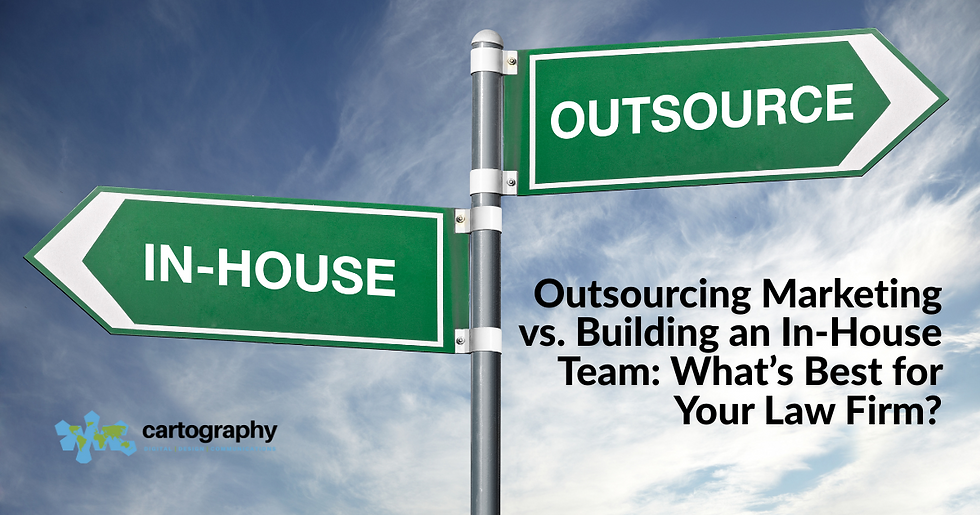Outsourcing Marketing vs. Building an In-House Team: What’s Best for Your Law Firm?
- Cooper Shattuck

- Sep 3, 2025
- 3 min read
Marketing is no longer optional for law firms. It is essential. The real question is not whether you should market your firm, but how. Should you invest in an in-house team or hire an outside agency or consultant? The best choice depends on your firm’s size, resources, goals, and culture.
Let’s look at the pros and cons.

The Case for an In-House Marketing Team
For larger firms with steady marketing needs, building an in-house team can be the right move. Here are some benefits:
Deep Firm Knowledge: People who work alongside you every day understand your practice areas, lawyers, and clients. They can tailor messaging and strategy to match your firm’s unique voice.
Day-to-Day Availability: When marketing staff are down the hall, you don’t have to wait on an outside partner’s schedule. If you need a press release tomorrow, you can have it in motion right away.
Culture Alignment: Marketing is about more than campaigns. It also reflects culture. In-house staff can live and breathe your firm’s values and translate them into authentic branding.
Control: With an internal team, you have direct oversight of how your brand is represented and how your budget is spent.
The downside is cost. Hiring and retaining a marketing team can be expensive once you add up salaries, benefits, training, software, and turnover. Many firms can afford a marketing coordinator, but not the wide range of skills that modern marketing requires, such as SEO, design, analytics, and PR.
The Case for Outsourcing Marketing
Outsourcing law firm marketing to an agency, consultant, or fractional CMO offers clear advantages, especially for small and mid-sized firms:
Access to Specialists: Modern marketing requires many different skills: SEO, writing, video, branding, design, and more. Outsourcing gives you access to all of these without hiring each role individually.
Scalability: You can scale your investment up or down depending on your goals. If you need a big campaign for a new practice area, you can increase efforts. If you only need light maintenance for a while, you can scale back.
Cost-Effectiveness: Outsourcing often gives you more value for the money. Instead of one or two employees, you get an entire team of experts.
Fresh Perspective: Outside partners bring insights from working with other firms and industries. They can spot opportunities and risks you might miss.
Less Overhead: You avoid payroll taxes, benefits, and office space. You also save on software costs, since agencies already have the tools to run digital campaigns.
The tradeoff is that outsourcing requires strong communication. If you do not keep your agency or consultant updated on your firm’s activities and successes, they won’t be able to tell your story effectively.
Hybrid Approaches
Many firms benefit from a mix of both approaches. One option is hiring an in-house coordinator to manage internal communication, collect content from attorneys, and work directly with outside experts. The coordinator acts as the point person, while outsourced partners handle strategy, campaigns, design, and analytics. This balance provides the advantages of in-house knowledge with the depth of outside expertise.
Questions to Ask Before Deciding
What is our budget?If you cannot support multiple full-time marketing roles, outsourcing may be the wiser choice.
What are our priorities?Are you launching a new practice area, rebranding, or recruiting younger talent? Different goals may call for different resources.
Do we have internal champions?Attorneys need to participate by writing, speaking, or sharing wins. Even the best agency cannot market a firm without lawyer involvement.
Do we want more control or more expertise?If control and speed matter most, in-house may be the better path. If you value specialized knowledge and efficiency, outsourcing is often the answer.
The Cartography Perspective
At Cartography, we have seen both models work, and we have also seen both fail. Success is less about which path you choose and more about whether your approach fits your goals, resources, and commitment.

.png)



Comments